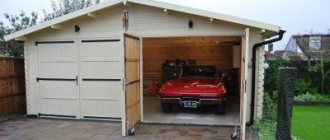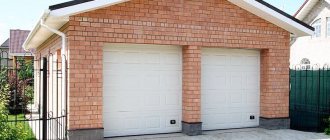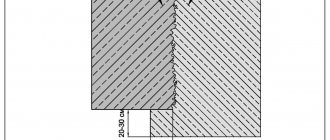- 27.3.2018
- 64915
Officials have set themselves the task of forcing Russians to pay a tax on outbuildings located on private plots; in addition, they periodically try to impose a tax on all country houses and huts in Russia. But the authorities are hampered by the fact that, by law, the owner of a cottage/bathhouse/shed is NOT obligated to register them with the cadastral register. And without such registration there can be no tax. Officials at various levels have repeatedly stated the need for forced registration of huts and chicken coops, but so far such “forced” activity is illegal.
What can be built on a personal plot?
Part 2 of Article 4 of the Federal Law of July 7, 2003 No. 112-FZ “On Personal Subsistence Farming” states that on a personal plot of land it is permitted to place residential buildings, industrial, household and other buildings, structures and structures that comply with urban planning regulations, and also environmental, sanitary and hygienic, fire safety and other rules and regulations.
It is worth remembering that, according to Articles 130-131 of the Civil Code of the Russian Federation, all real estate must be registered in the Unified State Register of Real Estate (USRN).
Is it necessary to register a gazebo on a summer cottage?
You can build anything on a privatized plot. But, problems may arise at the time of sale of the plot, the new owner entering into inheritance of the plot, at the time of donation. The Requirements for filling out a declaration on real estate objects say:
“Only real estate is subject to state registration at the time of filling out the column “buildings and structures.” Accordingly, additional and auxiliary structures, which in turn do not belong to the class of real estate objects, do not require state registration, either in general or in a simplified manner.”
What buildings need to be registered?
The information that now buildings on the plots are not only subject to registration, but also taxed, met with a negative reaction and raised many questions from the general public. However, worries about the fact that now it would be impossible to even install a dog kennel or build a gazebo were in vain. Only real estate is subject to mandatory registration.
Comments to Article 130 of the Civil Code of the Russian Federation establish the following criteria for recognizing property as real estate:
- the presence of a foundation for the building;
- impossibility of separating the building without causing serious damage;
- availability of connected communications (water supply, sewerage, gasification, etc.);
- Solid materials were used in construction rather than prefabricated parts.
For example, bathhouses on a foundation, capital summer kitchens, detached garages and workshops fit these requirements. Most of the buildings that are usually erected on garden plots: greenhouses, sheds, gazebos, barbecue areas, summer showers, wells, barrel baths, firewood sheds, toilets and other buildings without a foundation do not fall under the category of “real estate”.
Registration of a bathhouse on a land plot
You need to register capital buildings, regardless of their purpose, if you want them to be your property. The right of ownership gives the opportunity to dispose of property in full. In the future, you can easily sell, donate, inherit, and even insure the built bathhouse.
- Application for permission to build on a land plot (sample and form can be found on the Internet);
- A document that confirms the right to own a land plot;
- Land plan;
- Passport of the applicant or representative;
- Project documentation, which includes an explanatory note, information about utility networks, a diagram of the location of buildings on the site, etc.;
- A positive conclusion on the design documentation, if expertise is required.
Why register outbuildings?
Any phrase that begins with the word “tax on...” will cause a negative reaction in advance. Therefore, it is not surprising that the owners of gardens and vegetable plots reacted extremely negatively to the latest innovations. The main argument is that the costs of maintaining the territory and all the buildings located on it fall on the shoulders of the owner and do not in any way affect the financial interests of the state. This means that it cannot have any material claims against the owner of the site. However, we should not forget here that by registering real estate in the Unified State Register of Real Estate and paying tax on it, the owner receives certain preferences.
Registration of a building allows it to be passed on by inheritance
Firstly, registered real estate can be inherited or donated. Secondly, registered buildings increase the cadastral value of the site, which by law cannot be more than the market value. In other words, if you and your neighbor are going to sell your plots, but other relatively equal conditions, your garage and bathhouse will be registered, but his will not, then your property will be valued higher.
Thirdly, such property can be insured. If your site suffers from flooding or any other insured event, a certificate from the Unified State Register of Real Estate is the only evidence that the garage roof, and not an empty space, was damaged by a fire during a thunderstorm.
Timely registration in the Unified State Register will protect you from conflicts with neighbors
And finally, the fourth, not the most obvious reason is proof of the primacy of the building. For example, your neighbor, with whom you have coexisted well for many years, has decided to sell his plot. Meanwhile, the new owner of the territory is going to breed pigs, and if the buildings on your side of the fence are not registered, he has every chance of getting permission to build a pigsty in the immediate vicinity of your summer kitchen.
Tax on outbuildings
As already mentioned, property tax is imposed only on those economic buildings that are included in the Unified State Register of Real Estate and are real estate objects. Buildings that are not registered as real estate are not subject to tax. Tax rates are set by local governments, so they may vary from municipality to municipality. In Yekaterinburg, the following rates apply when calculating tax on outbuildings and residential buildings.
Tax on outbuildings for residents of Yekaterinburg
- Construction costing up to 300 thousand rubles. – tax rate 0.1%;
- Construction costing over 300 to 500 thousand rubles. – tax rate 0.3%;
- Construction costing from 500 thousand rubles. – tax rate 2%.
Tax on a private house for residents of Yekaterinburg
- House worth up to 300 thousand rubles. – tax rate 0.1%;
- A house worth over 300 to 500 thousand rubles. – tax rate 0.25%;
- A house worth from 500 thousand rubles. – tax rate 2500 rubles + 1% of the amount over 500 thousand.
The conservatism of the regional authorities unexpectedly allowed Sverdlovsk residents to save on taxes, having built cottages, houses, bathhouses, and sheds over the past four years. The fact is that information about the inventory value of real estate was received by the tax office from the BTI until March 1, 2013. After this date no information is provided. That is, the Federal Tax Service Administration for the Sverdlovsk Region cannot assess tax on objects introduced after March 1, 2013. Since there is no data on the inventory value, there is nothing to calculate the tax from.
The inventory cost of an object located in Yekaterinburg can be found in the office of the city BTI at the address: st. Weiner, 9a. The cost of the certificate is 1000 rubles. However, the certificate will indicate the cost as of 2013. Today's value will have to be calculated manually using a deflator coefficient.
The inventory value is calculated based on the degree of deterioration of the building, as well as the materials from which it was built. It is far from the market one. The cadastral value takes into account the area in which the object is located, infrastructure and other aspects. It is closer to the market price. The cadastral value of a plot of land or other real estate can be found out using the electronic services of Rosreestr - the Public Cadastral Map and the service for obtaining information about objects online.
Do I need a permit to build a barn and other outbuildings?
The Town Planning Code provides a list of real estate objects, the construction of which does not require permits:
- garages and other buildings that will not be used for financial gain, such as bathhouses and summer kitchens;
- buildings for domestic and economic purposes that are not objects of capital construction: kiosks, gazebos, sheds, greenhouses (to put it simply, any objects without a foundation);
- other buildings that do not contradict established standards.
This means that even if you are going to build a capital facility on your site that requires registration, you still do not need to obtain permission for its construction. However, in order for your building to be registered with the Unified State Register of Real Estate, it must comply with the requirements of SNiP.
Is it necessary to register a decorative gazebo on a summer cottage?
This is a completely different matter, the stone cannot be disassembled without causing damage to the structure, such a gazebo needs a foundation (the building cannot be disconnected from the foundation without destroying it, I mean the structure, not the foundation), which means you need registration and moreover, You must obtain permission to build such a gazebo.
And if your gazebo is a light structure without signs of “capitalism” (without a foundation and can be dismantled at any time without causing damage to the structure and the site as a whole), then a permit is not needed and registration is not needed.
We recommend reading: Document regulating the number of days a child can be absent from school without a certificate
Standards for the location of buildings
| Criteria | Standards |
| Distance between outer buildings and groups of buildings | 6 m |
| Distance between outer buildings and groups of wooden buildings | 15 m |
| Water disposal | Rainwater runoff from the roof should not enter the neighboring area |
| Distance to roadway | At least 5 m |
| Distance from the house to the barn, bathhouse and other outbuildings | Can stand alone or be adjacent to the house, but have a separate entrance at least 7 m away |
| Distance from the building to the site boundary | 3m |
| Distance to buildings intended for keeping small livestock or poultry | 4 m |
| To other buildings or bushes | 1m |
| To tall trees | 4 m |
| Up to medium-sized trees | 2 m |
| Height of outbuildings | At least 2 m |
| Distance to the boundaries of neighboring plots located on the eastern, western, northern and other intermediate sides | Not less than the height of the economic facility (measured from the ground to the ridge of the roof) |
| Distance from the well to the bathhouse, sauna or shower or buildings for small livestock or poultry | 12 m |
What and how to register at a summer cottage in 2021
Dacha owners must understand that they can dispose of any piece of real estate, that is, sell, bequeath, etc., only after it has been registered. What should those who, for one reason or another, have not completed or stopped building a house and want to sell it, do?
We recommend reading: Compensation by agreement of the parties after maternity leave is subject to personal income tax 2021
Only land plots and residential buildings require mandatory registration. All other structures are registered at the request of the owner. The exceptions are those that are not considered capital, that is, do not have a strong connection with the surface of the earth. These include, for example, garden gazebos or prefabricated metal garages. However, these buildings must be marked on the cadastral plan of the site.
How to register a barn and other outbuildings?
Until March 1, 2021, the owner could register his house using a simplified procedure for registering ownership of real estate. Now it will be much more difficult to do this, however, with regard to the registration of other objects (garage, bathhouse, land plot), the “dacha amnesty” will remain indefinite. Capital buildings on the site are registered at the local MFC upon presentation of the following documents:
- applicant’s passport or representative’s power of attorney (original for presentation);
- statements;
- document confirming payment of state duty;
- technical plan for the house (part 7 of article 70 of Federal Law No. 218), household. building or dacha (issued by any cadastral engineer for a fee).
- title documents for land (provided that there is no record of registered ownership of it in the Unified State Register of Real Estate).
Previously, the owner of the building received a certificate of registration of ownership, but now instead of it an extract from the Unified State Register is issued.
In fact, the “toilet tax” turned out to be nothing more than an overblown news story for the media, and most structures in gardens and summer cottages still do not require approval.
Features of registration of buildings at the dacha under the dacha amnesty
- You have no other registration;
- The dacha is located in a populated area, and not on land that is intended for farming;
- The house is suitable for living in both winter and summer;
- The site and buildings on it are your property;
- There is court permission that you can register on the site.
The presented innovation should not make the registration procedure more complicated, since obtaining the necessary documents will be quite simple. But it is assumed that not all the benefits of the dacha amnesty will be preserved until 2021, which means that ultimately the procedure will become more complicated. It is still possible to register a land plot in a simplified manner. To do this, you should contact Rosreestr or the MFC, submit an application and provide some document for the land. This could even be a decision from the executive committee, or a certificate of ownership, as well as an extract taken from the household ledger.
Legislative regulation of the issue
If we turn to No. 93-FZ, it becomes clear that a citizen can confirm his rights to buildings erected on a personal plot in a simplified manner.
To do this, you need to register real estate. To briefly convey the meaning of the law, it is that previously unauthorized construction was not prosecuted by the law. The owner of the plot could build a garage or bathhouse at any time, without having to contact the authorities and obtain permission.
Permission to build a bathhouse on the site
Documents are reviewed within 10 days, after which the owner receives permission or a ban on construction work. Such a document is valid for 10 years from the date of its receipt.
If a future facility is being built on a plot of land and receives the status of a permanent structure, then registration of the bathhouse is required. This is necessary for the owner to perform legal actions in relation to the property - purchase, sale, insurance, donation and inheritance.










